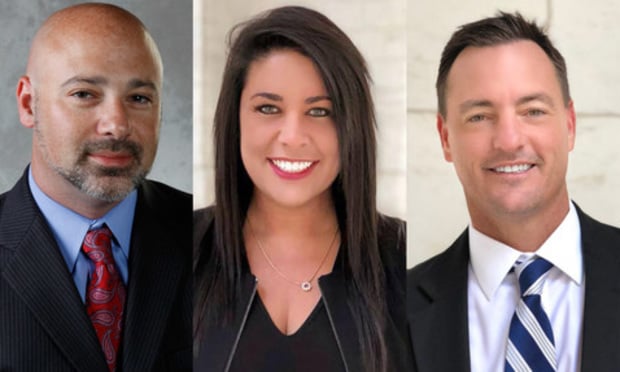Without Accidents, Aviation Law Grows in New Areas
When I first started working on aviation cases 20 years ago, it was not uncommon for my time to be spent defending lawsuits related to commercial airline…
May 01, 2018 at 06:00 AM
6 minute read
The original version of this story was published on Texas Lawyer

When I first started working on aviation cases 20 years ago, it was not uncommon for my time to be spent defending lawsuits related to commercial airline accidents. Much has changed since then, as the airline industry becomes ever safer. In 2017, there were zero passenger deaths on commercial jets worldwide. The last airline passenger death on U.S. soil was in 2013 when South Korea's Asiana Airlines Flight 214 struck the seawall while landing short of the runway in San Francisco (Ed note: the print deadline for this article preceded the fatality that occurred on a Southwest Airlines flight in mid-April.)
No other industry that involves the risks inherent in air travel can match the U.S. airlines' record for accomplishing their ultimate purpose—to safely deliver people from one point to the other. This success is no accident: in addition to commercial aviation's pervasive safety culture, the detailed inspections, overhauls and testing of an aircraft's airframe, engine, and components are designed to spot and correct problems before they become catastrophic. Of equal importance, any commercial pilot has years of experience and training before setting foot on the airline flight deck. This training continues throughout all crew members' careers.
Despite—or perhaps because of—the commercial airlines' impressive safety record, most negative attention the airlines attract now relates to customer service. Last year, air carriers transported over 4 billion passengers worldwide. Along the way, flights were canceled, bags were lost, and passengers got into physical altercations with authorities (and each other). As accidents fade from the collective memory, and the airlines' safety record becomes mundane, these are the incidents that fuel public dissatisfaction with the industry. They also generate lawsuits.
One of the specific challenges that airlines face is to provide acceptable service to passengers with disabilities. The Air Carrier Access Act, 49 U.S.C. § 41705, was enacted by Congress to prohibit commercial airlines from discriminating against such passengers, partly in response to the U.S. Supreme Court's decision in U.S. Department of Transportation v. Paralyzed Veterans of America, 477 U.S. 597 (1986), in which the court held that commercial air carriers are not liable for violations of a law that was the precursor to the Americans with Disabilities Act. The ACAA requires the Secretary of Transportation to review all complaints received by air carriers alleging discrimination based on a disability. Complaints can also be filed directly with the Department of Transportation's Aviation Consumer Protection Division, which is required to investigate each one.
The ACAA does not include an express private right of action for individuals to recover damages. Instead, the ACAA and its attendant regulations provide for comprehensive enforcement mechanisms. See 49 U.S.C. § 41705; 49 U.S.C. § 46301; 14 C.F.R. Part 382. The ACAA gives the DOT authority to issue orders to compel compliance with statutory provisions, revoke the air carrier's certificate and impose significant monetary penalties. It also authorizes the Attorney General to bring civil actions.
For a time, some Texas courts concluded that private litigants could also recover monetary damages under the ACAA. However, the framework for determining when there is a private right of action for violations of the laws without an express private right of action were refined in the U.S. Supreme Court's opinion in Alexander v. Sandoval, 532 U.S. 275 (2001), which held that “private rights of action to enforce federal law must be created by Congress. The judicial task is to interpret the statute Congress has passed to determine whether it displays an intent not just to create a private right but also a private remedy.”
Prior to Sandoval, the Fifth Circuit held in Shinault v. American Airlines, Inc., 936 F.2d 796 (5th Cir. 1991) that the ACAA did provide a private right of action. However, other circuit courts, having the benefit of the Court's guidance in Sandoval, have since analyzed whether the ACAA permits a private right of action and have concluded that it does not. See Lopez v. Jet Blue Airways, 662 F.3d 593 (2d Cir. 2011); Boswell v. Skywest Airlines, Inc., 361 F.3d 1263 (10th Cir. 2004); Love v. Delta Air Lines, 310 F.3d 1347 (11th Cir. 2002).
An appeal now pending before the Fifth Circuit should clarify whether that court's pre-Sandoval court's decision in Shinault should be explicitly overruled. Stokes v. Southwest Airlines involves the claim of a minor child who was traveling with his family and alleged that he was prohibited from flying because he has autism. Southwest moved to dismiss a claim for violation of the ACAA, arguing that the act provided no private right of action. The United States District Court in the Northern District of Texas initially denied the motion, but then dismissed the claims on rehearing.
In its unpublished order, the trial court relied on the Fifth Circuit's decision in Conservation Force v. Delta Air Lines, Inc., 682 Fed. Appx. 310 (5th Cir. 2017) (per curiam). In Conservation Force, the court interpreted another aviation regulation related to cargo, 49 U.S.C. § 41310, and held that the law provided no private right of action. Comparing the framework of the two statutes, the district court concluded that there was no way to “meaningfully distinguish” them and held that there was no private right of action for a violation of the ACAA. The plaintiff appealed the dismissal. Now, the Fifth Circuit can examine the ACAA with the benefit of Sandoval and Conservation Force and assess whether the act provides for a private right of action. If the court follows the reasoning of other circuits and correctly examines the structure and language of the ACAA, it should hold that there is no such right and overrule Shinault.
Author Update: Just days after this printed article went to press, the Fifth Circuit issued its opinion in Stokes v. Southwest Airlines on April 5, 2018. The court overruled Shinault and held that the ACAA confers no private right of action.
Pamela C. Hicks is a founding shareholder of Hicks Davis Wynn in Houston. As part of its general litigation practice, the firm represents airlines, helicopter operators, engine and component part manufacturers, aircraft owners and fixed-base operators.
This content has been archived. It is available through our partners, LexisNexis® and Bloomberg Law.
To view this content, please continue to their sites.
Not a Lexis Subscriber?
Subscribe Now
Not a Bloomberg Law Subscriber?
Subscribe Now
NOT FOR REPRINT
© 2025 ALM Global, LLC, All Rights Reserved. Request academic re-use from www.copyright.com. All other uses, submit a request to [email protected]. For more information visit Asset & Logo Licensing.
You Might Like
View All
Florida Attorneys Win $4.8M Over Former Lawyer's 'Preventable' Heart Attack on Birthday Cruise

Cruising for a Bruising: Passenger Personal Injury Suits Flow, But Tide Changes on Crew Member Litigation

How Fort Lauderdale Attorneys Won a $71 Million Verdict Despite Their Client's Low Medical Bills
5 minute read
Fort Lauderdale Lawyers Win Nearly $71 Million Verdict for Yacht Rape Victim
3 minute readTrending Stories
- 1'It's Not Going to Be Pretty': PayPal, Capital One Face Novel Class Actions Over 'Poaching' Commissions Owed Influencers
- 211th Circuit Rejects Trump's Emergency Request as DOJ Prepares to Release Special Counsel's Final Report
- 3Supreme Court Takes Up Challenge to ACA Task Force
- 4'Tragedy of Unspeakable Proportions:' Could Edison, DWP, Face Lawsuits Over LA Wildfires?
- 5Meta Pulls Plug on DEI Programs
Who Got The Work
Michael G. Bongiorno, Andrew Scott Dulberg and Elizabeth E. Driscoll from Wilmer Cutler Pickering Hale and Dorr have stepped in to represent Symbotic Inc., an A.I.-enabled technology platform that focuses on increasing supply chain efficiency, and other defendants in a pending shareholder derivative lawsuit. The case, filed Oct. 2 in Massachusetts District Court by the Brown Law Firm on behalf of Stephen Austen, accuses certain officers and directors of misleading investors in regard to Symbotic's potential for margin growth by failing to disclose that the company was not equipped to timely deploy its systems or manage expenses through project delays. The case, assigned to U.S. District Judge Nathaniel M. Gorton, is 1:24-cv-12522, Austen v. Cohen et al.
Who Got The Work
Edmund Polubinski and Marie Killmond of Davis Polk & Wardwell have entered appearances for data platform software development company MongoDB and other defendants in a pending shareholder derivative lawsuit. The action, filed Oct. 7 in New York Southern District Court by the Brown Law Firm, accuses the company's directors and/or officers of falsely expressing confidence in the company’s restructuring of its sales incentive plan and downplaying the severity of decreases in its upfront commitments. The case is 1:24-cv-07594, Roy v. Ittycheria et al.
Who Got The Work
Amy O. Bruchs and Kurt F. Ellison of Michael Best & Friedrich have entered appearances for Epic Systems Corp. in a pending employment discrimination lawsuit. The suit was filed Sept. 7 in Wisconsin Western District Court by Levine Eisberner LLC and Siri & Glimstad on behalf of a project manager who claims that he was wrongfully terminated after applying for a religious exemption to the defendant's COVID-19 vaccine mandate. The case, assigned to U.S. Magistrate Judge Anita Marie Boor, is 3:24-cv-00630, Secker, Nathan v. Epic Systems Corporation.
Who Got The Work
David X. Sullivan, Thomas J. Finn and Gregory A. Hall from McCarter & English have entered appearances for Sunrun Installation Services in a pending civil rights lawsuit. The complaint was filed Sept. 4 in Connecticut District Court by attorney Robert M. Berke on behalf of former employee George Edward Steins, who was arrested and charged with employing an unregistered home improvement salesperson. The complaint alleges that had Sunrun informed the Connecticut Department of Consumer Protection that the plaintiff's employment had ended in 2017 and that he no longer held Sunrun's home improvement contractor license, he would not have been hit with charges, which were dismissed in May 2024. The case, assigned to U.S. District Judge Jeffrey A. Meyer, is 3:24-cv-01423, Steins v. Sunrun, Inc. et al.
Who Got The Work
Greenberg Traurig shareholder Joshua L. Raskin has entered an appearance for boohoo.com UK Ltd. in a pending patent infringement lawsuit. The suit, filed Sept. 3 in Texas Eastern District Court by Rozier Hardt McDonough on behalf of Alto Dynamics, asserts five patents related to an online shopping platform. The case, assigned to U.S. District Judge Rodney Gilstrap, is 2:24-cv-00719, Alto Dynamics, LLC v. boohoo.com UK Limited.
Featured Firms
Law Offices of Gary Martin Hays & Associates, P.C.
(470) 294-1674
Law Offices of Mark E. Salomone
(857) 444-6468
Smith & Hassler
(713) 739-1250






